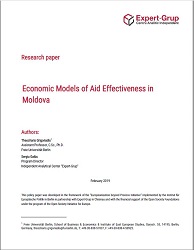Economic Models of Aid Effectiveness in Moldova
Economic Models of Aid Effectiveness in Moldova
Author(s): Theocharis Grigoriadis, Sergiu Gaibu
Subject(s): Public Administration, EU-Approach / EU-Accession / EU-Development, Fiscal Politics / Budgeting
Published by: EXPERT-GRUP Centrul Analitic Independent
Keywords: EU development aid to Moldova;
Summary/Abstract: In this paper, we provide an overview of the objectives and challenges to be met in the delivery of EU development aid to Moldova. Our analysis, carried out with pooled OLS, suggests that aid commitments and the number of aid projects are conducive to higher levels of socio-economic development; while the results for aid disbursements are in the same direction, they are less robust. EU development aid is effective when we introduce the three-year lag and the outcome variable is long-term investment, meaning that the impact of EU development aid can be observed in the medium and long-run, which points on positive and sustainable impact on the development of the country. Giving Central European bilateral donors such as Austria, Slovakia, and Romania a share in the programs does tend to generate higher levels of socio-economic performance. The same observation holds for transport, health, and water projects. The authors found that aid disbursements are much lower compared to aid commitments, revealing a large unexplored potential of EU development aid in Moldova, which is mostly due to governance issues in Moldova. In order to bridge the gap between aid commitments and aid disbursements, it is important for the European Union to bolster transnational sovereignty partnerships that bypass central government budgets and foster the implementation of local-scale projects with the participation of subnational bureaucracies and local civil society.
Series: EXPERT-GRUP — Documente de Politici
- Page Count: 33
- Publication Year: 2019
- Language: English
- Content File-PDF

